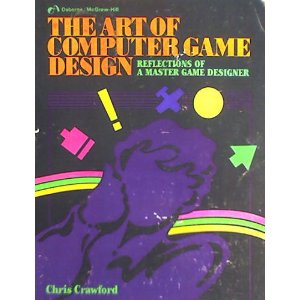I’ve just finished The Art of Computer Game Design by Chris Crawford (1984) – the Kindle edition with chapter endnotes added this year. This was a pleasantly focused little book.
Given its age (27 years?), the book contains both humorously quaint period references, and shocking accurate future predictions. This by itself makes the book entertaining. The core of the book, however, is untarnished by age – these are mostly timeless design principles.
I found two points most memorable.
The first is a simple reinforcement of an idea I’m seeing reiterated several places: A good design begins with a core idea. Not a setting or genre or mechanic, but a unifying theme or message or experience that holds water prior to its implementation. This is the game’s raison d’être. It’s something I need to reflect on for a while; I’m inherently attracted to the game mechanisms that drive game experiences, and therefore risk missing the point (or forgetting to create one).
The second point is that I/O is the biggest weakness of the computer games medium, and thus I/O design may be the most critical part of the process. I referenced this idea in my last post, about Dwarf Fortress. Crawford’s new endnotes in this area don’t address the recent advances in I/O like touchscreens, pointers and motion control. Instead he talks about how little progress we’ve made in this area. I don’t want to assume he sees these new technologies as gimmicks (I’m pretty sure touchscreens will be around for a while) but he does seem a hair out of touch.
I’m tempted to make that generalization for all of Crawford’s new notes, actually. He’s got plenty to say about the odd stunted development of the industry and the large quantity of shovelware still being produced, but besides a nod to the interactive fiction community he seems largely unaware of the games and developers pushing the industry forward today. I would think Crawford would be proud of the Portals and Demon’s Souls‘, and the Terry Cavanaghs and Gregory Weirs, but there’s no mention of these. It’s a very cynical view of the industry as a whole, and it’s unclear whether he’s trying to spur us to action or is really out of touch with the positive elements of the indie game scene.
I do understand his concern that games built on rich simulation are becoming less popular, replaced by shiny action games, simpler casual experiences, and rich networked communities that generate even larger and more complex systems. I’m not ready to label this as a bad thing – it’s more about us discovering new strengths of the platform(s) than it is about us ignoring the computer’s primary strength. I also think there will always be a place for simulation in each of these arenas, if only to enrich other experiences – and there will also be a place for simulation as a core experience (see the lens of the toy, per Schell).
